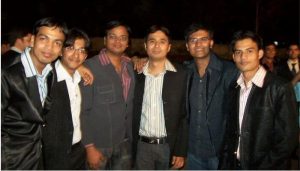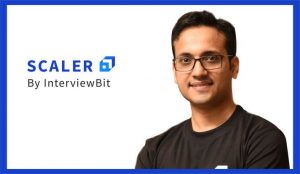They say college friends are your friends for life. This sure holds true for IIITH alumni Anshuman Singh and Abhimanyu Saxena. From batchmates in 2010 to startup founders of InterviewBit & Scaler Academy, they’ve come a long way.
Picture this. You’ve been working on your lab project through the day and way into the night when you realise you need a small, yet vital component that’s in the locked lab next door. What do you do? Most of us would get some sleep and come back in the morning. But if you’re aspiring entrepreneurs like Anshuman and Abhimanyu, you just crawl through the AC ducts between the two labs, get what you need and complete the task!

CS by Design, Friends by Chance
For both Anshuman & Abhimanyu, opting for IIITH was a conscious decision. It was their love for Computer Science that brought them to Hyderabad. Abhimanyu, who hails from Amarkantak, a picturesque little town in Satpura Range studied at NIT – Nagpur for a year before switching to IIITH. “I was certain I wanted to pursue Computer Science at the institute. It was my first rebellion”, he says.
Anshuman, originally from Akbarpur, an agricultural town in UP, got to know about IIITH from Mr Pathak, his school teacher in Lucknow, who encouraged him to apply. Based on Mr Pathak’s recommendation, IIITH was the only college on Anshuman’s AIEEE application.
While a shared interest in CS and programing consciously brought them to IIITH, their first meeting literally spilt over. Abhimanyu recollects with a laugh, “College had just started. I was in a rush to attend Prof C V Jawahar’s morning class, the doors to which would shut at 8:30am sharp. In my haste to get there on time from the mess, I accidentally spilt half a bowl of sambar on Anshuman!”

Startup Stepping Stones
While IIITH is well known today for its strong programming culture, according to Anshuman, even a decade ago students were actively participating in competitive programming. He represented India as a finalist for two years consecutively in the ACM International Collegiate Programming Contest (ICPC).
The entrepreneurial bug caught them early in 2008 while still on campus. The duo, along with another batchmate Jayraj Bhattacharya, built Daksh, a home automation system prototype. The application allowed users to remotely regulate their home appliances. Daksh managed to secure funding, but the trio soon found it difficult to juggle it along with their regular coursework. They mutually consented to sell their first venture, even though the product had great potential and was way ahead of its time.
But the startup fervour was still going strong, resulting in their next venture, Campus Bhopu, a precursor of sorts to Facebook. Users could post anonymously, and form shared interest groups. Not surprisingly, it was a hit within the student community with about 1,000 users averaging approximately 3,000 posts a day!
Once an entrepreneur, always an entrepreneur
Despite the on-campus success, once they graduated and corporate jobs came along, Campus Bhopu fizzled out. Anshuman was hired by Facebook. In fact, he holds a unique distinction of being among the first few programmers to be hired directly from India, and was part of the team that built Facebook Messenger. Just 2 – 3 months into the job, Anshuman was already conducting recruitment interviews! He humbly attributes his accelerated career progression to conducive circumstances. For the next two years, he co-led the hiring panel for the Indian and Hong Kong region, after which he was part of the small team that setup the Facebook Engineering office in London from scratch.

Abhimanyu joined Progress Software as a programmer, and 18 months later moved to Fab.com. The job took him to New York, Berlin and finally Pune, where he led the company’s learning program and was also actively involved in recruitments.
Despite their hectic work schedules, the duo would make it a point to meet at least twice a year to brainstorm, and soon had 14-15 business ideas documented. Four years into their jobs, in 2014, both decided to quit. Anshuman explains that it was an easy decision since they both were convinced of the direction they were headed. A tougher challenge was onboarding their families to share their vision.
Why InterviewBit?
By 2014, Abimanyu and Anshuman had interviewed hundreds of candidates for their respective companies. What became increasingly apparent with each interview was a stark disconnect between university education and industry requirements. The gap was all the more glaring in Tier 2/ Tier 3 college graduates. Intending to bridge the gap between talent and company fit, they launched InterviewBit in 2015.
“The motive was always to solve a problem with a solution that would impact a larger population – something that we were best positioned at solving”, they collectively explain.
According to Anshuman, InterviewBit was more or less an experiment. Albeit a successful one at that. It provided them with an insight on how people interact with online systems, what keeps them engaged and what gets them hooked.
Abhimanyu refers to it as a massive public library of programming problems. But with no funding and earnings, they had to revise their business model and engage with companies as potential recruiters for their users. In 2018, Uber drove all of its campus hiring entirely from InterviewBit. By 2019, InterviewBit had a million registered users and some of the biggest names in the industry hiring through them.

With a steady revenue stream in place, they decided to go back to their core values: quality tech education for the masses. In April 2019, Scaler Academy was launched. A virtual tech academy with a comprehensive 6-month program, the courses are designed in consultation with senior engineers and hiring managers. Instructors are tech leaders and subject matter experts from the industry.
Reflecting on to their own student life, Anshuman says one of his earliest memories of college is of a senior who worked all day and night in the lab. That was the moment he realized that hard work has no bounds. They recognize the importance of many such multifaceted experiences at IIITH that have moulded their development and success – be it access to seniors and professors for mentorship, due importance to lab work or a strong programming culture.
They’ve tried to emulate these human interactions in Scaler. Lectures are always live streamed with stress on peer-to-peer learning. Students are encouraged to chat among themselves. Group contests are part of the coursework. There are designated TAs and mentors assigned.
The response to the program has been tremendous. Scaler received over 10,000 applications for their first batch of only 200 seats. More than 2,000 students have enrolled for the program to date. Anyone can apply to this all-inclusive learning platform. There is no criteria for applicants, just a condition that they should be available to be placed by the time program ends and that they clear the online assessment.
Scaling the Future
Scaler Academy in its current avatar offers limited seats to 200-300 students. This is nowhere close to its dream of bringing quality technical education for anyone who seeks it. The end goal is to do away with traditional Tier2/Tier3 colleges.
Wanting to make brick and mortar colleges redundant could be one of the less radical ideas in their kitty. Abhimanyu would like to see the years at college overlap as work experience and is a strong advocate of the power of youth. Their advice for current students is to make the most of your college years. Learn, network and keep your eyes on the prize.
He believes they can create magic with the right tool and education at hand. With a $20 million funding from Sequoia India’s surge accelerator program in their kitty, we sure wish they will.


